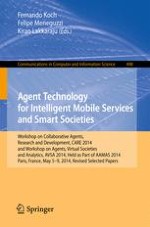This book constitutes the refereed proceedings of the Workshop on Collaborative Agents, Research and Development, CARE 2014, and the Workshop on Agents, Virtual Societies and Analytics, AVSC 2014, held as Part of AAMAS 2014 in Paris, France, in May 2014. The 10 revised full papers presented were carefully reviewed and selected from more than 40 submissions. The papers deal with the following topics: an ubiquitous service-oriented architecture for urban sensing; geo-fencing based disaster management service; applying ontologies and agent technologies to generate ambient intelligence applications; VIRTUAL-ME: a library for smart autonomous agents in multiple virtual environments; shared message boards for smart enterprises; an improved learning automata approach for the route choice problem; urban context detection and context-aware recommendation via networks of humans as sensors; mining social interaction data in virtual worlds; a multi-agent architecture to support ubiquitous applications in smart environments; caring for my neighborhood: a platform for public oversight.
